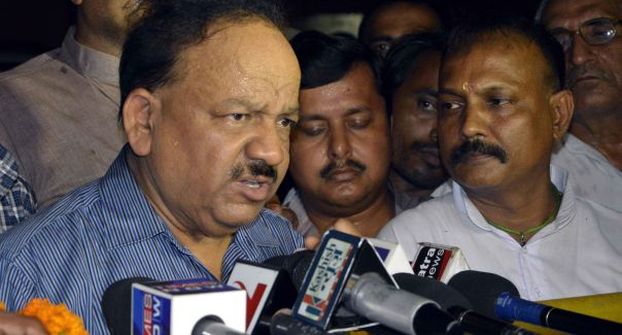 September 29 is World Heart Day 2014
September 29 is World Heart Day 2014
The World Heart Day was founded in the year 2000 with an aim to educate people all around the world about the dangers of heart disease and stroke, which form the world’s leading causes of death, killing about 17.3 million people every year. The last Sunday of September, recognised as the World Heart Day, calls for collaborative efforts to reach as many people as possible for increasing heart disease awareness.
On Sunday, Union Health Minister Dr Harsh Vardhan made an announcement about a series of government campaigns focusing on major communicable and non-communicable diseases. These campaigns involve efforts from NGOs, religious organisations, educational institutions, medical professionals of the government and private sectors, clubs and related social forums as means to developing a social movement over health.
The Minister Vardhan made an announcement saying, ‘A specific day in a year will be specially dedicated to create awareness about a particular disease.’ Earlier, Vardhan had announced that November 7 would be observed as National Cancer Awareness Day, apart from February 4 which is already marked as World Cancer Day. ‘We will use such occasions to educate citizens about the particular disease at the prevention and curative levels, the importance of timely check-ups and other matters.’
Harsh Vardhan also mentioned the governments’ plan to mark special days for diabetes, anaemia, hypertension, blindness, deafness, malnutrition, obesity, mental conditions and issues related to infant and maternal mortality. Speaking to reporters on the sidelines of an event, ‘Walk away from heart attack’, to mark ‘World Heart Day’ which falls on Monday, September 29, the Union Minister said social mobilisation was essential to making public health work. He lauded the initiative and thanked the organisers -Delhi Medical Association, Rotary Club (District 3010), Saket City Hospital, New Delhi Municipal Committee, Resident Welfare Association of East Delhi, United RWA Joint Action and some city schools.
He observed, ‘Every human body is a stakeholder in the country’s health system. If each body can be kept healthy through balanced diet, avoidance of smoking, drinking and substance abuse, and, put through at least half an hour’s exercise and walk each day, then the entire disease burden of the country would drop dramatically and the Health Ministry’s budget will be optimally utilised.’
After participating in a walk, held in the inner circle of Connaught Place, Dr Harsh Vardhan appealed to all doctors, health workers and NGO activists to work harder to make people aware about the dangers of cardiovascular diseases -the single biggest cause of premature death. ‘Heart disease and strokes are becoming more common in our society than before. I see younger and younger people falling victim to this killer. There is widespread ignorance of the simple fact that it is preventable,’ he said.
Dr Harsh Vardhan also advised NGOs to dedicate some of their energies to training neighbourhood people with knowledge in how to administer Cardio Pulmonary Resuscitation (CPR). He pointed out, ‘Half the number of fatalities from heart attack is caused by delayed transportation to hospital, yet many of these deaths can be avoided by timely CPR. For this I urge DMA, the RWAs and like-minded groups to conduct camps to train people in such techniques.’
‘The government can lay out hospitals but it would never be possible for it to do enough without the help of developing health resources among common people in awareness generation for disease prevention as well as skills in first aid,’ he remarked. World Heart Day was conceptualised to inform people around the world of the danger of heart disease and stroke. The World Heart Federation, in collaboration with World Health Organisation, uses the occasion to spread the message that at least 80 percent of premature deaths from this quarter can be avoided if the main risk factors -tobacco, unhealthy diet and the sedentary lifestyle – are abandoned.
Here are some natural foods to prevent heart disease
Flaxseed
Mahatma Gandhi once observed, ‘Wherever flaxseed becomes a regular food item among people, there will be better health.’ It is a tiny seed but yet so powerful when it comes to health. Flax or ‘alsi’ may be relatively new as a health food but its history is very old. 10 years ago almost every western nutrition book I read, talked about one thing – flaxseeds or linseeds (it has two names) and their vital importance for healthy heart functioning. It is rich in omega-3 fatty acids, preventing inflammation, thus protecting heart health. It is a wonderful way to lower cholesterol due to its amazing antioxidant properties as well as omega-3. Sprinkle it on your salad, make a chutney out of it, boil it with water or have it raw — it helps in any form.
Lemon
Vitamin C is a very powerful antioxidant that helps lower cholesterol and thereby keeps the heart healthy. It helps the utilisation of fat, thereby preventing cholesterol from clogging your arteries. Lemon juice helps in keeping the blood pressure low, reducing your risk of cardiovascular diseases. It is worth squeezing a lemon to make a fresh-fruit drink because lemon ranks high as a health food and contain very few calories. Read more about 5 natural foods to prevent heart disease
With inputs from ANI
Photo source: Getty images
You may also like to read:
- Suffering from heart disease? Here are foods you should avoid
- Why going vegetarian may be better for your heart
- Heart disease in India — 6 shocking facts you should know
For more articles on heart disease, visit our heart disease section. Follow us on Facebook andTwitter for all the latest updates! For daily free health tips, sign up for ournewsletter. And to join discussions on health topics of your choice, visit our Questions and Answers section.






0 comments:
Post a Comment